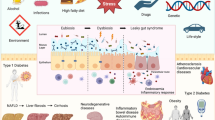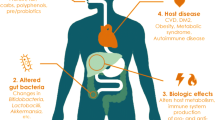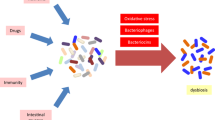Abstract
2-Amino-1-methyl-6-phenylimidazo[4,5-b]pyridine (PhIP) is an abundant dietary carcinogen, formed during high-temperature cooking of meat. In this study, we investigated whether clinically relevant ATP-binding cassette (ABC) efflux transporters can modulate PhIP-induced colorectal carcinogenesis in vivo using wild-type (WT), Bcrp1−/−; Mrp2−/−; Mrp3−/− and Bcrp1−/−; Mdr1a/b−/−; Mrp2−/− mice. We used a physiological mouse model of colorectal cancer; a combination of a single high-dose oral PhIP administration (200 mg/kg), followed by administering a colonic inflammatory agent, dextran sodium sulfate (DSS), in drinking water for 7 days. Pilot experiments showed that both knockout strains were more sensitive to DSS-induced colitis compared to WT mice. Lack of these transporters in mice also led to clearly altered disposition of activated PhIP metabolites after a high-dose oral PhIP administration. The results suggest that Mdr1a/1b, Bcrp1 and Mrp2 contributed to biliary excretion and Mrp3 to sinusoidal secretion of the pre-carcinogenic metabolite N2-OH-PhIP. The levels of a genotoxicity marker, PhIP-5-sulphate, were at least 4- and 17-fold reduced in the intestinal tissue and intestinal content of both knockout strains compared to WT mice. In line with these findings, the level of colon carcinogenesis was reduced by two- to four-fold in both knockout strains compared to WT mice when PhIP and DSS treatments were combined. Thus, perhaps counterintuitively, reduced activity of these ABC transporters may in part protect from PhIP-induced colon carcinogenesis. Collectively, these data suggest that ABC transporters are important in protecting the body from inflammatory agents such as DSS, in the disposition of carcinogenic metabolites, and in determining the sensitivity to dietary PhIP-induced carcinogenesis.




Similar content being viewed by others
References
Alexander J, Reistad R, Frandsen H, Grivas S (1997) Binding of 2-amino-1-methyl-6-phenylimidazo[4,5-b]pyridine (PhIP) to protein- and low molecular weight thiols and its role in ring hydroxylation. Mutat Res 376(1–2):7–12
Alvarez AI, Real R, Perez M, Mendoza G, Prieto JG, Merino G (2010) Modulation of the activity of ABC transporters (P-glycoprotein, MRP2, BCRP) by flavonoids and drug response. J Pharm Sci 99(2):598–617. https://doi.org/10.1002/jps.21851
Bernstein AM, Song M, Zhang X et al (2015) Processed and unprocessed red meat and risk of colorectal cancer: analysis by tumor location and modification by time. PLoS One 10(8):e0135959. https://doi.org/10.1371/journal.pone.0135959
Boobis AR, Lynch AM, Murray S et al (1994) CYP1A2-catalyzed conversion of dietary heterocyclic amines to their proximate carcinogens is their major route of metabolism in humans. Cancer Res 54(1):89–94
Borst P, Elferink RO (2002) Mammalian ABC transporters in health and disease. Annu Rev Biochem 71:537–592. https://doi.org/10.1146/annurev.biochem.71.102301.093055
Brand W, Schutte ME, Williamson G et al (2006) Flavonoid-mediated inhibition of intestinal ABC transporters may affect the oral bioavailability of drugs, food-borne toxic compounds and bioactive ingredients. Biomed Pharmacother 60(9):508–519. https://doi.org/10.1016/j.biopha.2006.07.081
Brinar M, Cukovic-Cavka S, Bozina N et al (2013) MDR1 polymorphisms are associated with inflammatory bowel disease in a cohort of Croatian IBD patients. BMC Gastroenterol 13:57. https://doi.org/10.1186/1471-230X-13-57
Buonarati MH, Turteltaub KW, Shen NH, Felton JS (1990) Role of sulfation and acetylation in the activation of 2-hydroxyamino-1-methyl-6-phenylimidazo[4,5-b]pyridine to intermediates which bind DNA. Mutat Res 245(3):185–190
Chan DS, Lau R, Aune D et al (2011) Red and processed meat and colorectal cancer incidence: meta-analysis of prospective studies. PLoS One 6(6):e20456. https://doi.org/10.1371/journal.pone.0020456
Chassaing B, Aitken JD, Malleshappa M, Vijay-Kumar M (2014) Dextran sulfate sodium (DSS)-induced colitis in mice. Curr Protoc Immunol 104:15–25 https://doi.org/10.1002/0471142735.im1525s104
Chen C, Ma X, Malfatti MA et al (2007) A comprehensive investigation of 2-amino-1-methyl-6-phenylimidazo[4,5-b]pyridine (PhIP) metabolism in the mouse using a multivariate data analysis approach. Chem Res Toxicol 20(3):531–542. https://doi.org/10.1021/tx600320w
Cheung C, Loy S, Li GX, Liu AB, Yang CS (2011) Rapid induction of colon carcinogenesis in CYP1A-humanized mice by 2-amino-1-methyl-6-phenylimidazo[4,5-b]pyridine and dextran sodium sulfate. Carcinogenesis 32(2):233–239. https://doi.org/10.1093/carcin/bgq235
Chou HC, Lang NP, Kadlubar FF (1995) Metabolic activation of the N-hydroxy derivative of the carcinogen 4-aminobiphenyl by human tissue sulfotransferases. Carcinogenesis 16(2):413–417
Crofts FG, Strickland PT, Hayes CL, Sutter TR (1997) Metabolism of 2-amino-1-methyl-6-phenylimidazo[4,5-b]pyridine (PhIP) by human cytochrome P4501B1. Carcinogenesis 18(9):1793–1798
Crofts FG, Sutter TR, Strickland PT (1998) Metabolism of 2-amino-1-methyl-6-phenylimidazo[4,5-b]pyridine by human cytochrome P4501A1, P4501A2 and P4501B1. Carcinogenesis 19(11):1969–1973
Cross AJ, Sinha R (2004) Meat-related mutagens/carcinogens in the etiology of colorectal cancer. Environ Mol Mutagen 44(1):44–55. https://doi.org/10.1002/em.20030
Cross AJ, Peters U, Kirsh VA et al (2005) A prospective study of meat and meat mutagens and prostate cancer risk. Cancer Res 65(24):11779–11784. https://doi.org/10.1158/0008-5472.CAN-05-2191
Cross AJ, Ferrucci LM, Risch A et al (2010) A large prospective study of meat consumption and colorectal cancer risk: an investigation of potential mechanisms underlying this association. Cancer Res 70(6):2406–2414. https://doi.org/10.1158/0008-5472.CAN-09-3929
Dietrich CG, de Waart DR, Ottenhoff R, Bootsma AH, van Gennip AH, Elferink RP (2001a) Mrp2-deficiency in the rat impairs biliary and intestinal excretion and influences metabolism and disposition of the food-derived carcinogen 2-amino-1-methyl-6-phenylimidazo. Carcinogenesis 22(5):805–811
Dietrich CG, de Waart DR, Ottenhoff R, Schoots IG, Elferink RP (2001b) Increased bioavailability of the food-derived carcinogen 2-amino-1-methyl-6-phenylimidazo[4,5-b]pyridine in MRP2-deficient rats. Mol Pharmacol 59(5):974–980
Edwards RJ, Murray BP, Murray S et al (1994) Contribution of CYP1A1 and CYP1A2 to the activation of heterocyclic amines in monkeys and human. Carcinogenesis 15(5):829–836
Eichele DD, Kharbanda KK (2017) Dextran sodium sulfate colitis murine model: An indispensable tool for advancing our understanding of inflammatory bowel diseases pathogenesis. World J Gastroenterol 23(33):6016–6029. https://doi.org/10.3748/wjg.v23.i33.6016
Englund G, Jacobson A, Rorsman F, Artursson P, Kindmark A, Ronnblom A (2007) Efflux transporters in ulcerative colitis: decreased expression of BCRP (ABCG2) and Pgp (ABCB1). Inflamm Bowel Dis 13(3):291–297. https://doi.org/10.1002/ibd.20030
Enokizono J, Kusuhara H, Ose A, Schinkel AH, Sugiyama Y (2008) Quantitative investigation of the role of breast cancer resistance protein (Bcrp/Abcg2) in limiting brain and testis penetration of xenobiotic compounds. Drug Metab Dispos 36(6):995–1002. https://doi.org/10.1124/dmd.107.019257
Esumi H, Ohgaki H, Kohzen E, Takayama S, Sugimura T (1989) Induction of lymphoma in CDF1 mice by the food mutagen, 2-amino-1-methyl-6-phenylimidazo[4,5-b]pyridine. Jpn J Cancer Res 80(12):1176–1178
Fleisher B, Unum J, Shao J, An G (2015) Ingredients in fruit juices interact with dasatinib through inhibition of BCRP: a new mechanism of beverage-drug interaction. J Pharm Sci 104(1):266–275. https://doi.org/10.1002/jps.24289
Frandsen H, Alexander J (2000) N-acetyltransferase-dependent activation of 2-hydroxyamino-1-methyl-6-phenylimidazo[4,5-b]pyridine: formation of 2-amino-1-methyl-6-(5-hydroxy)phenylimidazo [4,5-b]pyridine, a possible biomarker for the reactive dose of 2-amino-1-methyl-6-phenylimidazo[4,5-b]pyridine. Carcinogenesis 21(6):1197–1203
Glatt H (2000) Sulfotransferases in the bioactivation of xenobiotics. Chem Biol Interact 129(1–2):141–170
Gooderham NJ, Murray S, Lynch AM et al (2001) Food-derived heterocyclic amine mutagens: variable metabolism and significance to humans. Drug Metab Dispos 29(4 Pt 2):529–534
Gooderham NJ, Zhu H, Lauber S, Boyce A, Creton S (2002) Molecular and genetic toxicology of 2-amino-1-methyl-6-phenylimidazo[4,5-b]pyridine (PhIP). Mutat Res 506–507:91–99
Ho GT, Soranzo N, Nimmo ER, Tenesa A, Goldstein DB, Satsangi J (2006) ABCB1/MDR1 gene determines susceptibility and phenotype in ulcerative colitis: discrimination of critical variants using a gene-wide haplotype tagging approach. Hum Mol Genet 15(5):797–805. https://doi.org/10.1093/hmg/ddi494
Huang Y (2007) Pharmacogenetics/genomics of membrane transporters in cancer chemotherapy. Cancer Metastasis Rev 26(1):183–201. https://doi.org/10.1007/s10555-007-9050-6
Iizasa H, Genda N, Kitano T et al (2003) Altered expression and function of P-glycoprotein in dextran sodium sulfate-induced colitis in mice. J Pharm Sci 92(3):569–576. https://doi.org/10.1002/jps.10326
Ito N, Hasegawa R, Sano M et al (1991) A new colon and mammary carcinogen in cooked food, 2-amino-1-methyl-6-phenylimidazo[4,5-b]pyridine (PhIP). Carcinogenesis 12(8):1503–1506
Kristiansen E, Mortensen A, Sorensen IK (1998) Effects of long-term feeding with 2-amino-1-methyl-6-phenylimidazo[4,5-b]pyridine (PhIP) in C57BL/ByA and E mu-pim-1 mice. Cancer Lett 122(1–2):215–220
Lauber SN, Gooderham NJ (2007) The cooked meat derived genotoxic carcinogen 2-amino-3-methylimidazo[4,5-b]pyridine has potent hormone-like activity: mechanistic support for a role in breast cancer. Cancer Res 67(19):9597–9602. https://doi.org/10.1158/0008-5472.CAN-07-1661
Lauber SN, Gooderham NJ (2011) The cooked meat-derived mammary carcinogen 2-amino-1-methyl-6-phenylimidazo[4,5-b]pyridine promotes invasive behaviour of breast cancer cells. Toxicology 279(1–3):139–145. https://doi.org/10.1016/j.tox.2010.10.004
Lauber SN, Ali S, Gooderham NJ (2004) The cooked food derived carcinogen 2-amino-1-methyl-6-phenylimidazo[4,5-b] pyridine is a potent oestrogen: a mechanistic basis for its tissue-specific carcinogenicity. Carcinogenesis 25(12):2509–2517. https://doi.org/10.1093/carcin/bgh268
Layton DW, Bogen KT, Knize MG, Hatch FT, Johnson VM, Felton JS (1995) Cancer risk of heterocyclic amines in cooked foods: an analysis and implications for research. Carcinogenesis 16(1):39–52
Leslie EM, Deeley RG, Cole SP (2005) Multidrug resistance proteins: role of P-glycoprotein, MRP1, MRP2, and BCRP (ABCG2) in tissue defense. Toxicol Appl Pharmacol 204(3):216–237. https://doi.org/10.1016/j.taap.2004.10.012
Li M, Wu Y, Hu Y, Zhao L, Zhang C (2018) Initial gut microbiota structure affects sensitivity to DSS-induced colitis in a mouse model. Sci China Life Sci 61(7):762–769. https://doi.org/10.1007/s11427-017-9097-0
Maeda K, Sugiyama Y (2008) Impact of genetic polymorphisms of transporters on the pharmacokinetic, pharmacodynamic and toxicological properties of anionic drugs. Drug Metab Pharmacokinet 23(4):223–235
Maggio-Price L, Shows D, Waggie K et al (2002) Helicobacter bilis infection accelerates and H. hepaticus infection delays the development of colitis in multiple drug resistance-deficient (mdr1a−/−) mice. Am J Pathol 160(2):739–751. https://doi.org/10.1016/S0002-9440(10)64894-8
Malfatti MA, Buonarati MH, Turteltaub KW, Shen NH, Felton JS (1994) The role of sulfation and/or acetylation in the metabolism of the cooked-food mutagen 2-amino-1-methyl-6-phenylimidazo[4,5-b]pyridine in Salmonella typhimurium and isolated rat hepatocytes. Chem Res Toxicol 7(2):139–147
Melgar S, Karlsson A, Michaelsson E (2005) Acute colitis induced by dextran sulfate sodium progresses to chronicity in C57BL/6 but not in BALB/c mice: correlation between symptoms and inflammation. Am J Physiol Gastrointest Liver Physiol 288(6):G1328–G1338. https://doi.org/10.1152/ajpgi.00467.2004
Mijac D, Vukovic-Petrovic I, Mijac V et al (2018) MDR1 gene polymorphisms are associated with ulcerative colitis in a cohort of Serbian patients with inflammatory bowel disease. PLoS One 13(3):e0194536. https://doi.org/10.1371/journal.pone.0194536
Minchin RF, Reeves PT, Teitel CH et al (1992) N-and O-acetylation of aromatic and heterocyclic amine carcinogens by human monomorphic and polymorphic acetyltransferases expressed in COS-1 cells. Biochem Biophys Res Commun 185(3):839–844
Nakagama H, Nakanishi M, Ochiai M (2005) Modeling human colon cancer in rodents using a food-borne carcinogen, PhIP. Cancer Sci 96(10):627–636. https://doi.org/10.1111/j.1349-7006.2005.00107.x
Nakanishi M, Tazawa H, Tsuchiya N, Sugimura T, Tanaka T, Nakagama H (2007) Mouse strain differences in inflammatory responses of colonic mucosa induced by dextran sulfate sodium cause differential susceptibility to PhIP-induced large bowel carcinogenesis. Cancer Sci 98(8):1157–1163. https://doi.org/10.1111/j.1349-7006.2007.00528.x
Nishikawa A, Imazawa T, Kuroiwa Y et al (2005) Induction of colon tumors in C57BL/6J mice fed MeIQx, IQ, or PhIP followed by dextran sulfate sodium treatment. Toxicol Sci 84(2):243–248. https://doi.org/10.1093/toxsci/kfi079
Ochiai M, Imai H, Sugimura T, Nagao M, Nakagama H (2002) Induction of intestinal tumors and lymphomas in C57BL/6N mice by a food-borne carcinogen, 2-amino-1-methyl-6-phenylimidazo[4,5-b]pyridine. Jpn J Cancer Res 93(5):478–483
Okayasu I, Hatakeyama S, Yamada M, Ohkusa T, Inagaki Y, Nakaya R (1990) A novel method in the induction of reliable experimental acute and chronic ulcerative colitis in mice. Gastroenterology 98(3):694–702
Onnie CM, Fisher SA, Pattni R et al (2006) Associations of allelic variants of the multidrug resistance gene (ABCB1 or MDR1) and inflammatory bowel disease and their effects on disease behavior: a case-control and meta-analysis study. Inflamm Bowel Dis 12(4):263–271. https://doi.org/10.1097/01.MIB.0000209791.98866.ba
Panwala CM, Jones JC, Viney JL (1998) A novel model of inflammatory bowel disease: mice deficient for the multiple drug resistance gene, mdr1a, spontaneously develop colitis. J Immunol 161(10):5733–5744
Pavek P, Merino G, Wagenaar E et al (2005) Human breast cancer resistance protein: interactions with steroid drugs, hormones, the dietary carcinogen 2-amino-1-methyl-6-phenylimidazo(4,5-b)pyridine, and transport of cimetidine. J Pharmacol Exp Ther 312(1):144–152. https://doi.org/10.1124/jpet.104.073916
Pazos M, Siccardi D, Mumy KL et al (2008) Multidrug resistance-associated transporter 2 regulates mucosal inflammation by facilitating the synthesis of hepoxilin A3. J Immunol 181(11):8044–8052
Reistad R, Frandsen H, Grivas S, Alexander J (1994) In vitro formation and degradation of 2-amino-1-methyl-6-phenylimidazo[4,5-b]pyridine (PhIP) protein adducts. Carcinogenesis 15(11):2547–2552
Saison C, Helias V, Ballif BA et al (2012) Null alleles of ABCG2 encoding the breast cancer resistance protein define the new blood group system Junior. Nat Genet 44(2):174–177. https://doi.org/10.1038/ng.1070
Schinkel AH, Jonker JW (2003) Mammalian drug efflux transporters of the ATP binding cassette (ABC) family: an overview. Adv Drug Deliv Rev 55(1):3–29
Schut HA, Snyderwine EG (1999) DNA adducts of heterocyclic amine food mutagens: implications for mutagenesis and carcinogenesis. Carcinogenesis 20(3):353–368
Schutte ME, Freidig AP, van de Sandt JJ, Alink GM, Rietjens IM, Groten JP (2006) An in vitro and in silico study on the flavonoid-mediated modulation of the transport of 2-amino-1-methyl-6-phenylimidazo[4,5-b]pyridine (PhIP) through Caco-2 monolayers. Toxicol Appl Pharmacol 217(2):204–215. https://doi.org/10.1016/j.taap.2006.08.005
Schutte ME, Boersma MG, Verhallen DA, Groten JP, Rietjens IM (2008) Effects of flavonoid mixtures on the transport of 2-amino-1-methyl-6-phenylimidazo[4,5-b]pyridine (PhIP) through Caco-2 monolayers: an in vitro and kinetic modeling approach to predict the combined effects on transporter inhibition. Food Chem Toxicol 46(2):557–566. https://doi.org/10.1016/j.fct.2007.08.038
Shirai T, Sano M, Tamano S et al (1997) The prostate: a target for carcinogenicity of 2-amino-1-methyl-6-phenylimidazo[4,5-b]pyridine (PhIP) derived from cooked foods. Cancer Res 57(2):195–198
Shirai T, Kato K, Futakuchi M et al (2002) Organ differences in the enhancing potential of 2-amino-1-methyl-6-phenylimidazo[4,5-b]pyridine on carcinogenicity in the prostate, colon and pancreas. Mutat Res 506–507:129–136
Sinha R (2002) An epidemiologic approach to studying heterocyclic amines. Mutat Res 506–507:197–204
Sinha R, Chow WH, Kulldorff M et al (1999) Well-done, grilled red meat increases the risk of colorectal adenomas. Cancer Res 59(17):4320–4324
Staley EM, Schoeb TR, Lorenz RG (2009) Differential susceptibility of P-glycoprotein deficient mice to colitis induction by environmental insults. Inflamm Bowel Dis 15(5):684–696. https://doi.org/10.1002/ibd.20824
Sugimura T, Wakabayashi K, Nakagama H, Nagao M (2004) Heterocyclic amines: Mutagens/carcinogens produced during cooking of meat and fish. Cancer Sci 95(4):290–299
Suzuki H, Morris JS, Li Y et al (2008) Interaction of the cytochrome P4501A2, SULT1A1 and NAT gene polymorphisms with smoking and dietary mutagen intake in modification of the risk of pancreatic cancer. Carcinogenesis 29(6):1184–1191. https://doi.org/10.1093/carcin/bgn085
Tanaka T, Suzuki R, Kohno H, Sugie S, Takahashi M, Wakabayashi K (2005) Colonic adenocarcinomas rapidly induced by the combined treatment with 2-amino-1-methyl-6-phenylimidazo[4,5-b]pyridine and dextran sodium sulfate in male ICR mice possess beta-catenin gene mutations and increases immunoreactivity for beta-catenin, cyclooxygenase-2 and inducible nitric oxide synthase. Carcinogenesis 26(1):229–238. https://doi.org/10.1093/carcin/bgh292
Teunissen SF, Vlaming ML, Rosing H, Schellens JH, Schinkel AH, Beijnen JH (2010) Development and validation of a liquid chromatography-tandem mass spectrometry assay for the analysis of 2-amino-1-methyl-6-phenylimidazo[4,5-b]pyridine (PhIP) and its metabolite 2-hydroxyamino-1-methyl-6-phenylimidazo[4,5-b]pyridine (N-OH-PhIP) in plasma, urine, bile, intestinal contents, faeces and eight selected tissues from mice. J Chromatogr B Analyt Technol Biomed Life Sci 878(25):2353–2362. https://doi.org/10.1016/j.jchromb.2010.07.012
Teunissen SF, Rosing H, Brunsveld L et al (2011) Analysis of 2-Amino-1-methyl-6-phenylimidazo[4,5-b]pyridine and its phase I and phase II metabolites in mouse urine using LC–UV–MS–MS. Chromatographia 74(3–4):215–226. https://doi.org/10.1007/s10337-011-2068-5
Turesky RJ, Lang NP, Butler MA, Teitel CH, Kadlubar FF (1991) Metabolic activation of carcinogenic heterocyclic aromatic amines by human liver and colon. Carcinogenesis 12(10):1839–1845
Turteltaub KW, Dingley KH, Curtis KD et al (1999) Macromolecular adduct formation and metabolism of heterocyclic amines in humans and rodents at low doses. Cancer Lett 143(2):149–155
van Herwaarden AE, Jonker JW, Wagenaar E et al (2003) The breast cancer resistance protein (Bcrp1/Abcg2) restricts exposure to the dietary carcinogen 2-amino-1-methyl-6-phenylimidazo[4,5-b]pyridine. Cancer Res 63(19):6447–6452
Vlaming ML, Mohrmann K, Wagenaar E et al (2006) Carcinogen and anticancer drug transport by Mrp2 in vivo: studies using Mrp2 (Abcc2) knockout mice. J Pharmacol Exp Ther 318(1):319–327. https://doi.org/10.1124/jpet.106.101774
Vlaming ML, Teunissen SF, van de Steeg E et al (2014) Bcrp1;Mdr1a/b;Mrp2 combination knockout mice: altered disposition of the dietary carcinogen PhIP (2-amino-1-methyl-6-phenylimidazo[4,5-b]pyridine) and its genotoxic metabolites. Mol Pharmacol 85(3):520–530. https://doi.org/10.1124/mol.113.088823
Ward MH, Sinha R, Heineman EF et al (1997) Risk of adenocarcinoma of the stomach and esophagus with meat cooking method and doneness preference. Int J Cancer 71(1):14–19
Whittem CG, Williams AD, Williams CS (2010) Murine colitis modeling using dextran sulfate sodium (DSS). J Vis Exp. https://doi.org/10.3791/1652
Acknowledgements
We thank Dr. Michael Hauptmann, Dr. Katarzyna Jozwiak and Mr. John Zavrakidis for the statistical support, and Dr. Seng Chuan Tang and Dr. Dilek Iusuf for occasional technical support in this project.
Author information
Authors and Affiliations
Corresponding author
Ethics declarations
Conflict of interest
This project was funded by internal funding from the Netherlands Cancer Institute. The authors declare that they have no conflict of interest.
Additional information
Publisher’s Note
Springer Nature remains neutral with regard to jurisdictional claims in published maps and institutional affiliations.
Electronic supplementary material
Below is the link to the electronic supplementary material.
Rights and permissions
About this article
Cite this article
Durmus, S., van der Valk, M., Teunissen, S.F. et al. ABC transporters Mdr1a/1b, Bcrp1, Mrp2 and Mrp3 determine the sensitivity to PhIP/DSS-induced colon carcinogenesis and inflammation. Arch Toxicol 93, 775–790 (2019). https://doi.org/10.1007/s00204-019-02394-w
Received:
Accepted:
Published:
Issue Date:
DOI: https://doi.org/10.1007/s00204-019-02394-w




